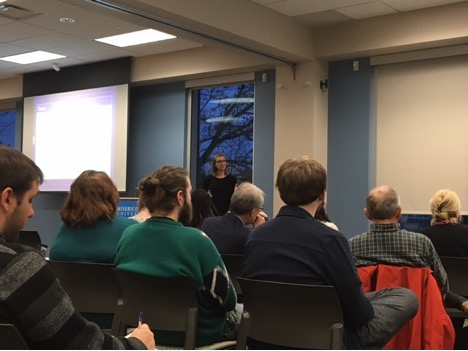‘Deadly Medicine’ Speaker Series Continues to Draw Crowds

As the “Deadly Medicine: Creating the Master Race” exhibit continues in the Pauly Friedman Art Gallery until March 14, a speaker series is contributing scholarly exploration into the Holocaust.
Dr. Amanda Caleb, director of the Medical Humanities program and event organizer, believes public events like the Deadly Medicine Speaker Series “are the backbone of a University. It is an opportunity to move beyond the classroom and to bring the public into conversations that help breakdown town and gown distinctions,” she said.
For Dr. Caleb, this series is especially important.
“The greatest tragedy we can commit is to become numb to history. When we accept the atrocities of the past as simply ‘history,’ we are, in my opinion, risking our own humanity.”
Dr. Margot Wielgus, assistant professor of philosophy, discussed the extensive medical language of the Holocaust. Wielgus specifically focused on “Deadly Euphemisms” and provided a philosophical analysis of the language during the Feb. 7 event.
Wielgus examined the power that language created in normalizing a horrific event like the Holocaust for medical professionals, S.S. Officers, others working in camps and general citizens.
She mentioneda Jewish author Hannah Arendt, who wrote a novel titled “Eichmann in Jerusalem” which is about an S.S. Officer who decided where people would go during the Holocaust – the camps to which they would be transported. Following the liberation of those in camps, the officer said “officialese is my only language.” He knew what was happening to people in the camps, yet he justified his actions by saying he was doing his job.
Wielgus then delved deeper into how language shaped the assimilation of the events of the Holocaust – how officers were doing their work, how the Holocaust was regarded as “the final solution”, and how medical procedures were considered to be acts of “looking after” or “curing.”
Wielgus added that the word “kill” is absent from official medical documents from the Holocaust.
Sophomore English Major Daniella Amendola found the use of language interesting.
“This idea that language can be used to sanitize or to weaponize certain ideas, it really makes you think about how language and euphemisms are used today.”
“If we’re careless with the truth or if we decide to consciously misconstrue facts, what does it say about our society?” asked Amendola.
Wielgus referred attendees to other novel works available at the Mary Kintz Bevevino library that adderess specific language used in the Holocaust.
One titled is “Auschwitz: A Doctor’s Eyewitness Account” written by Dr. Miklos Nyiszli, a Jewish doctor who viewed some of Dr. Mengele’s experiments. Dr. Mengele is regarded as the “Angel of Death” for his famous gruesome experiments on inmates during the Holocaust. Nyiszli addresses the Nazis’ special names for parts of camps, including gas chambers, referring to them as “baths” where inmates would be “cleaned up.”
She explained that Nazi doctors were just doctors and that it is important to recognize that and learn from it.
“The risk of the ‘them, not us’ mentality is that we fail to see how professionals – and people more broadly – can dehumanize others, and we therefore fail to see how we are capable of the same dehumanization.”
The second novel Wielgus mentioned is Wendy Lower’s book “Hitler’s Furies,” which is primarily about German females involved in the Holocaust, but the book also addresses how the government used language to put the Holocaust in a positive light. Officials used wording to make their “horrifying actions more palatable” by accrediting it to research and making the country better.
Amendola believed the presentation brought another layer to the conversation people don’t often think about.
“Linguistics is really fascinating because it’s not just learning words and root words but also the evolution of words, and how meanings change with time if we decide to apply a different meaning.”
Caleb said the Deadly Medicine Speaker Series has been well attended by students and the community – with about 660 attendees to all events up to Wielgus’ presentation.
“The response has been really great, particularly given that we’ve had weekly events. You worry about lecture fatigue, the idea that you can’t fit in an extra something every week, but that has not been the case,” Caleb said.
Past events of the “Deadly Medicine” speaker series included a presentation with Rabbi Larry Kaplan of Temple Israel of Wilkes-Barre and a presentation by Dr. Carol Rittner, RSM, of Stockton University, who discussed pedagogy in relation to teaching issues involved with the Holocaust. Rittner was joined by Dr. Okla Elliott, Assistant Professor of English, Taylor Rupp, and junior computer science Major Nicole Grassi.
Caleb said speakers from outside of the region are gaining popularity for the Speaker Series.
“The main interest is for speakers that have come from outside the area and are presenting in Lemmond, in part because they are names that members of the community and academic recognize.”
Events for the Deadly Medicine Speaker Series continue with a presentation by Dr. Thomas Hajkowski, Associate Professor of History and Government titled “The Medical Professional and the Nazi Regime” on Feb 21 at 7 p.m.
Rabbi Roger Lerner of Temple B’nai B’rith of Kingston will present “The Hippocratic Oath and Medical Research: Where’s the Line?” March 1 at noon.
The presentations are free and open to the public.
Eva Mozes Kor, a Holocaust survivor and a subject of Mengele’s twin experiments, will give the the final presentation of the series. Kor will present “The Triumph of the Human Spirit, from Auschwitz to Forgiveness” on March 14 at 7 p.m. in Lemmond Theater. This program is also open and free to the public, but tickets must be reserved due to limited seating.
The Catherine and Daniel Flood Endowment for the Humanities at Misericordia University, the College of Arts and Sciences, and the Medical Humanities program, which began in the fall 2017 semester , organized and presented the speaker series.
